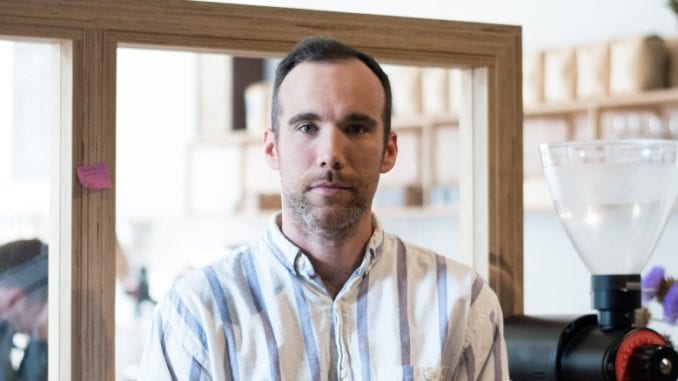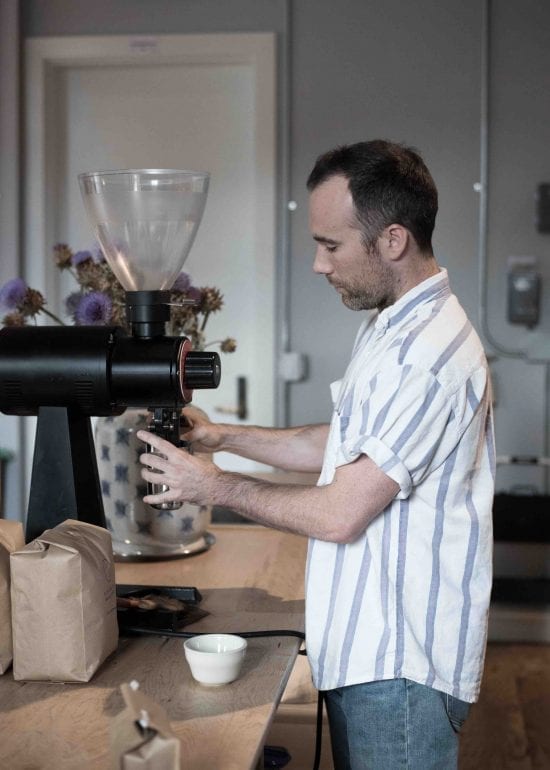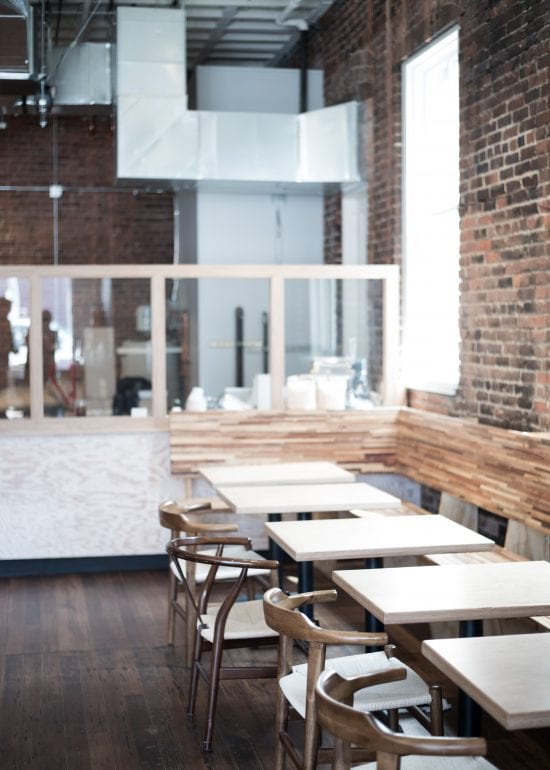
Brendan Mullally is the owner of Elm Coffee Roasters in Seattle, and he talks to us about opening a business, being a good leader, and how we in coffee can focus more on quality.
BY ASHLEY RODRIGUEZ
BARISTA MAGAZINE ONLINE
Brendan Mullally moved to New York to study philosophy, and ended up running the Joe Pro Shop, one of the most progressive coffee shops in the United States. He moved back to his hometown of Seattle to open Elm Coffee Roasters, a coffee shop and roastery dedicated to pushing the boundaries of coffee and quality. However, he admits he’s not quite there yet. We talked to Brendan about his coffee career and the struggles and triumphs he faces as a small business owner.
Ashley Rodriguez: Let’s talk about your life pre-coffee. What were you doing and what career path did you envision for yourself?
Brendan Mullally: Prior to doing coffee full-time, I was a graduate student at the New School studying philosophy. It had been my dream since I was about 16 to be a professor of philosophy. Weird, I know. However, I realized eventually that I didn’t see myself being happy with that career, and I moved to coffee as a career path.
AR: What was your first coffee job?
BM: When I was about 17 I worked at a local coffee shop in Seattle. I also worked for Peet’s Coffee & Tea in Seattle after I graduated college. When I moved to New York for graduate school, I began working for Joe (nee The Art of Coffee). It was generally a great experience, and I stayed there for seven years. I worked at the Waverly Place shop, for which I still have very fond memories, and helped open the Pro Shop.
AR: With Elm you’re opening a business by yourself, which is very challenging, obviously. How did you do it? How would you advise others who want to do the same?
BM: Lots of bull-headed stubbornness, tons of help from family and friends, and luck. My wife (Emily Lewis Mullally, for whom Elm is named) and I moved back to Seattle and lived with my parents for a year and a half while I was getting the business off the ground. I had some very naïve expectations about the timeline of opening the shop; I expected it to take six months or so, and it took two full years. I moved to Seattle with no financing and no space in mind.
The space was easy; I looked at two, and that was it. I knew I wanted to be in Pioneer Square because it is a lovely up-and-coming neighborhood and the rents were still relatively inexpensive. The money was much harder; I think I applied to 10 total banks for a loan, and not simultaneously. There was a point where I had a lease signed and no money, and that was … interesting. However, I finally convinced/cajoled a lender to buy in and fund the business.

AR: Why did you decide to open a business? What did you want to achieve in your business that you weren’t seeing in other cafés?
BM: In Seattle specifically I wanted a more modern approach to a roaster/retailer. The Pacific Northwest has some great roasters, but only a few are doing lighter-roast coffees and doing them really, really well. I also wanted to place a heavy emphasis on hospitality, and providing an excellent product without superfluous fussiness and tribal “nerdery” that I see in coffee.
I wanted to open my own business as I love the freedom but also the responsibility it involves. I like providing jobs and trying to provide a fun and positive and fulfilling work environment. I also frequently like doing things the hardest way possible.
AR: Tell me about your staff. How do you approach hiring and how do you think about employee happiness and retention?
BM: Previously it was pretty “by the seat of one’s pants,” and I am trying to steer away from this currently. Generally I hire people who are friendly and show that they are interested in hospitality first and foremost. Coffee knowledge is a bonus, but that can be trained. This calculation changes for different positions, of course. A production roaster has to be an excellent cupper, a trainer should have a great palate but also able to communicate effectively, etc.
Employee retention for a growing business is tough. One wants to give all the opportunities/compensation to deserving employees, but as a business owner I must always keep the health of the business in mind. I try to be as honest as possible with employees, show them that I appreciate their hard work, and reward that work whenever possible.
AR: What is the most important thing you do at the café as a leader?
BM: Growing the business is, or should be, my main job. The challenge is doing this while doing all the other jobs that I don’t have fixed positions for yet. If we were a large business I could hire managers, HR, a green buying department, etc. However, I am still doing a little bit of these. The goal is to eventually focus solely on growing the business.
As far as leading staff, I think having a good “social intelligence” is important. Be compassionate, but be forthright and honest. Try to ascertain if the staff morale is down. Try to communicate, and to encourage, direct communication. I am far from perfect on many of these things, but learning.
AR: What feels important to you in coffee?
BM: I think the “sustainable” and “ethical” catch words have become—more often than not—simply marketing terms. We try to avoid using these words, even though it is important and becoming more important to us. What is sustainable? What is ethical? How much do the pickers on your farm you visit once a year make? When are they paid? How much did your importer pay for a cargo of parchment? I feel like these questions are very complex and difficult, and just slapping the ethical label on something is lazy and counterproductive at best.

I also think that we all need to be more honest about the quality of what we are producing. This, I think, comes down to education and palate development. We’re all striving to make the best cup of coffee we can—and naturally people might have different ideas as to what that “best” tastes like. But I think we all need to try harder and keep raising the bar. As coffee professionals, we ought to be able to discern baggy or defective coffees, and be brutally honest with ourselves if that’s what we taste. We can’t be complacent when it comes to quality.
AR: What do you still struggle with as a leader? What are some of the biggest lessons you’ve learned as a leader?
BM: Communicating in an honest, direct manner, in a timely manner, is always the best route—even when it’s uncomfortable at times.
Do not try to do everything yourself. Talk to your loved ones and friends about your problems. If you don’t have a business partner, you need someone to talk to.
AR: What’s next for you, both small and big?
BM: New café by 2018, fingers crossed! And we hope to grow our wholesale program significantly this year! And my wife and I really, really want to get a dog.


Excellent interview of one of the finest entrepreneurs in the coffee business. We love Elm Coffee and wish there were more locations! Bravo Brendan Mullally!